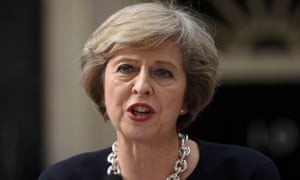 |
| Theresa May will restate that control of borders will be a red line for the government. Photograph: Hannah McKay/PA |
Theresa May will make a major speech on Brexit in an attempt to quell criticism that the government is not yet clear on its negotiating objectives for exiting the EU, as former diplomats hit out at the intense levels of criticism that ministers and civil servants have had to operate under.
The foreign secretary, Boris Johnson, and the Brexit secretary, David Davis, are contributing to the speech, expected later in January. It is expected to address Britain’s access to the European single market and a new immigration system for EU citizens.
May will restate that control of borders will be a red line for the government, inevitably making economic access a lower priority.
That means the government must be prepared for Britain to stop being a full member of the single market, although the prime minister has said she has an objective to secure maximum access for companies to trade with the EU.
Sir Ivan Rogers, who quit as the UK’s ambassador to the EU on Tuesday, sent a resignation letter in which he urged his staff and successor to challenge “ill-founded arguments and muddled thinking” – interpreted as an attack on Downing Street.
“We do not yet know what the government will set as negotiating objectives for the UK’s relationship with the EU after exit,” he wrote.
His successor, the former ambassador to Moscow Sir Tim Barrow, was appointed within 36 hours of Rogers’ departure, and was described by Downing Street as “a seasoned and tough negotiator, with extensive experience of securing UK objectives in Brussels”.
Tom Fletcher, the former ambassador to Lebanon, said there was frustration among civil servants in Whitehall not only with ministers, but with criticism from outside that the Brexit project was in a state of chaos and insistences they should be more transparent.
“I think people feel the scale of the challenge is enormous but we’ve got a lot of our best people on it,” he said. “I think people get a bit fed up of ‘why aren’t we being more open with the plans?’ Muhammad Ali didn’t brief everyone in advance on Rumble in the Jungle.
“Most of all, I think people are sick of the constant criticism. West Ham players perform much better when they’re not being booed by their own side the whole time. We need to let our people get on with it now.”
Fletcher said Barrow had showed he was a tough negotiator during his time in Moscow, as well as his previous experience in Brussels. “I’ve seen him in Brussels, he knows the corridors, he knows the characters,” he told BBC Radio 4’s Today programme.
“But more importantly, I’ve seen him in Moscow dealing with Putin there at a very testing time for our relationship and Tim had a reputation for being bulletproof out there. People often say diplomats have an iron fist in a velvet glove, I’ve seen his iron glove as well.”
Sir Robert Cooper, a former UK diplomat who is now a European commission official, said he expected that diplomats such as Barrow would “spend as least as much time negotiating with your own side as with the other side”.
Decisions had to be made in cooperation, Cooper said. “It’s no good people in Whitehall negotiating with themselves. It’s very important Tim should be involved in all the discussions going on in London,” he told BBC Radio 4 Today.
Diplomats and politicians should brush off criticism from outside, he said. “What really matters in the end is the 27 [EU countries], you have to understand what they are thinking.”
Lord Marland, chairman of the Commonwealth Enterprise and Investment Council and a former trade envoy under David Cameron, expressed concerns about the government’s ability to conduct tough negotiations. He said that politicians needed to lead the negotiations because civil servants were not well-equipped to do so.
He said: “My fear is that Whitehall as a whole has really not got the skill set to deliver a really hard-nosed negotiation and I think we have really got to upskill in that area to do it. If you’re too hard on negotiation you don’t win. Any negotiation has got to have something that’s in it for both parties.”
No comments:
Post a Comment